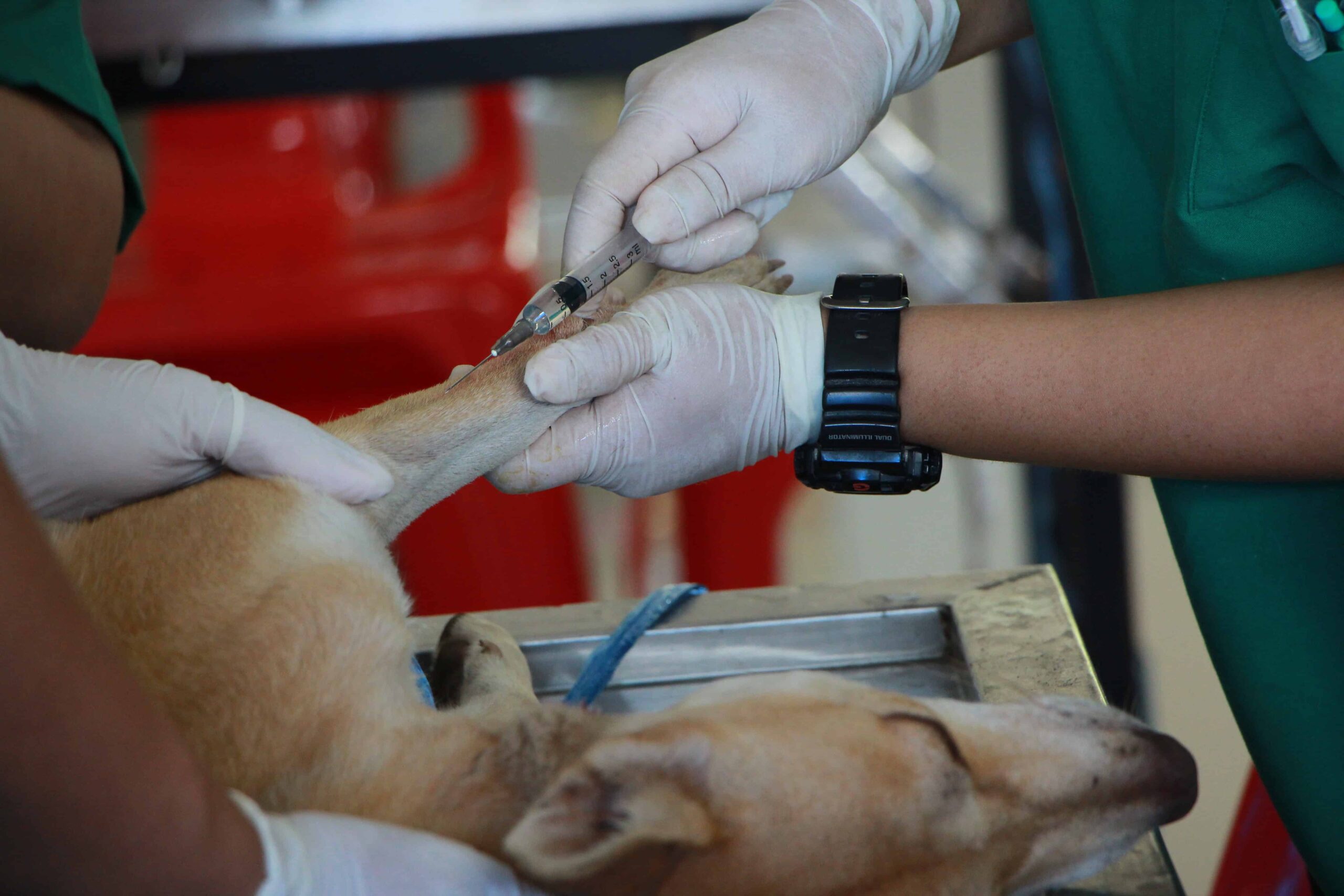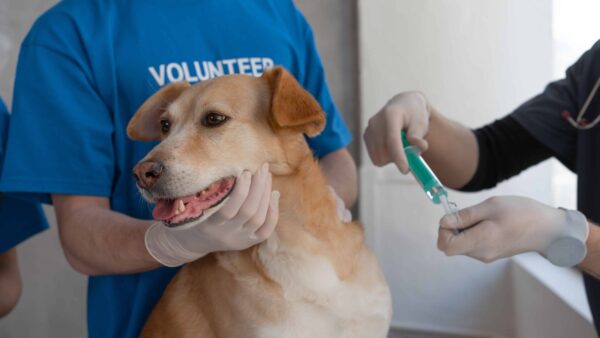Living in a canyon or environment covered with thick vegetation can be worrisome to you and your dog because these places are the main habitat of Rattlesnakes.
However, with the introduction of the Rattlesnake vaccine, your dog should be safe from the wrath of this deadly snake.
What is the Rattlesnake vaccine? The rattlesnake vaccine is a vaccine given to dogs to help them reduce the severity of rattlesnake bites if they were bitten by chance in the future.
The efficacy of the rattlesnake vaccine has been tested by many veterinarians, while some will say the vaccine is safe for dogs but not effective, others will say the vaccine is very effective and it helps to reduce the severity of rattlesnake bites.
The controversy made me research more and I was lucky to get the fact from a reputable vet named Dr. Drake Michele, who is the owner of Drake Center for Veterinary care.
According to her, the Rattlesnake vaccine is effective, and it works by helping your dog produce antibodies to the snake’s venom so that if by chance your dog was bitten by a rattlesnake, their antibody will help neutralize the toxin and thereby make the biting effect reduce. However, it is still recommended of you visit a veteran hospital immediately for proper treatment.
You should also know that while the rattlesnake vaccine is safe and effective for dogs, it still has its drawbacks, and this brings us back to this query “what are the pros and cons of the rattlesnake vaccine for dogs?” Without further ado, let’s discuss this query broadly and also get to know more about Rattlesnake and dogs.
What is the rattlesnake vaccine and how does it work?
The rattlesnake vaccine also known as Crotalus Atrox Toxoid was made by Red Rock Biologics about 20 years ago.
This vaccine helps to improve survival and reduce the severity of pains in dogs bitten by rattlesnakes. It works by stimulating the immune system of your dog to create strong and lasting antibodies that will help protect the tissues and other vital organs in your dog if they are being bitten by a rattlesnake.
This vaccine is subcutaneous i.e., given under the skin and it has two shots, that are usually taken 3 weeks after the other. An annual booster is also required for more efficiency.
The benefits of vaccinating your dog against rattlesnake venom.
Vaccinating your dog against rattlesnake venom comes with a lot of benefits and here are some of them:
- Reduced risk of death: A rattlesnake bite is fatal if not treated promptly. But, with vaccination, the chance of survival of your dog bitten by a rattlesnake will be increased. This vaccine will help preserve your dog’s life and also give your dog more time to receive proper medication.
- Reduced risk of suffering: A rattlesnake bite is very painful; the excruciating pain could be serious that your dog won’t be able to tolerate it. The rattlesnake vaccine will help to reduce the amount of pain your dog will go through.
- Improved peace of mind: For those that stay in areas dominated by rattlesnakes or those dog owners that usually take their dogs hiking in the wild, vaccinating your dog against rattlesnakes will give you peace of mind because this vaccine helps to reduce the risk of serious injury or death from a bite.
- Potential cost savings: Treatment for rattlesnake bites can be expensive, and some owners may not be able to afford the costs. Vaccination can help reduce the likelihood of a bite and potentially save owners money in the long run.
Potential risks and side effects of rattlesnake vaccine in dogs.
Just like other vaccines, the rattlesnake vaccine also has side effects in dogs. However, the benefits it offers to dogs weigh more than the risks.
Here are some of the side effects of the rattlesnake vaccine in dogs:
- Allergic reactions: Your dog may be allergic to one or more of the components of the vaccine which may lead to allergic reactions, some of the symptoms of allergies in your dog include swelling, hives, vomiting, etc.
- Injection site reactions: Some dogs may experience mild swelling, redness, or pain at the site of the injection. These reactions are usually mild and resolve on their own within a few days. According to research, 1% of dogs in about 3000 dogs might develop a lump at the sight of injection after being given the rattlesnake vaccine. This lump is not severe, and it will clear by itself after a few days.
- Interference with diagnostic tests: In rare cases, the rattlesnake vaccine may interfere with diagnostic tests that are used to detect and treat rattlesnake bites. This is because the vaccine can cause the dog’s body to produce antibodies that are similar to those produced in response to a real rattlesnake bite. As a result, it may be more challenging for veterinarians to accurately diagnose and treat the dog in the event of a bite. Top of Form
Is the rattlesnake vaccine right for your dog? Factors to consider.

The argument about the effectiveness of the rattlesnake vaccine might make you skeptical about giving your dog this vaccine.
But, according to a reputable veterinarian, this vaccine is effective and has proven to help reduce the severity of rattlesnake bites in dogs.
Here are some of the factors that should let you know if this vaccine is right for your dog or not:
- Your geographic location: If you live in snake-infested areas such as the Northern or Southern USA, especially Arizona which has the highest number of rattlesnake species, your dog might be at high risk of encountering a rattlesnake, this should make you consider getting this vaccine for your dog.
- Lifestyle and activity level: If your dog spends a lot of time outdoors, hiking, camping, or participating in other activities where they may come into contact with snakes, the vaccine may be a good idea.
- Your dog’s health: If your dog has an underlying health issue or a weakened immune system, you may not consider getting this vaccine for your dog because it might pose a health risk to your dog. To be on the safer side, I will advise you to consult with your vet about whether or not this vaccine will interfere with his health.
- The Efficiency of the vaccine: The rattlesnake vaccine has been proven to reduce the severity of symptoms in some cases of rattlesnake bites, but it is not 100% effective. It’s important to understand the limitations of the vaccine and not rely on it as the sole method of protection against snake bites.
Understanding the limitations of the rattlesnake vaccine and what it can and can’t do.
You should not mistake the rattlesnake vaccine for an antivenin. While the former is for mere protection, the latter is for treatment or cure from a rattlesnake bite.
Many misconceptions have been made about the rattlesnake vaccine. However, here is all you need to know about this vaccine:
- The rattlesnake vaccine only offers protective value by stimulating your dog’s immune system to produce antibodies that will help reduce the severity of the effect of a rattlesnake bite on your dog. This means you will still have to take your vaccinated dog for emergency treatment in a veteran hospital if he is bitten by a rattlesnake.
- The vaccine does not provide complete immunity. Even if your dog has been vaccinated, there is still a chance that it could have a severe reaction to a rattlesnake bite. This is because the vaccine is designed to help reduce the severity of symptoms, not prevent them entirely.
- The vaccine was solely developed to prevent dogs against the Western Diamondback rattlesnake, this means it is not effective for the more deadly specie of rattlesnake, especially the Mojave rattlesnake whose venom is far more toxic than that of the western diamond bank.
- The vaccine requires multiple doses. To provide the best level of protection, your dog will need to receive multiple doses of the vaccine over some time. This means that it’s important to start the vaccination process early before rattlesnake season begins.
How to prepare your dog for rattlesnake season: Vaccination, training, and other precautions
Whether or not rattlesnakes will come out depends on the local climate. However, they usually come out at the beginning of spring and stay active until the early fall season.
There are a series of precautions you can take to ensure your dog is safe during this period. Some of these include:
Vaccination
Vaccinating your dog with the rattlesnake vaccine at least 6 months before the early spring will help your dog build enough immunity against a rattlesnake bite.
This means if your dog gets bitten by chance, the extent of the symptoms of the bite will be greatly reduced because your dog has been vaccinated beforehand.
Snake Aversion Training

Snake aversion training is a type of training that is designed to teach dogs to recognize and avoid the scent and sound of venomous snakes, such as rattlesnakes.
It is usually done by a professional dog trainer. During this training, dogs are exposed to live or simulated snakes and are taught to associate the scent and sound of the snakes with negative consequences, such as a shock or a loud noise.
The goal of snake aversion training is to help dogs learn to avoid snakes in the future, reducing the risk of a potentially dangerous encounter. This type of training can be particularly useful for dogs that frequently spend time in areas where venomous snakes are known to be present, such as hiking trails or rural properties.
Keeping your Environment Clean
You should also cut the bush in your environment to keep snakes away. Remove all woodpiles and brushes and ensure there is no hole where snakes can easily crawl around you.
You should also eliminate small animals such as mice in your environment, this is because these animals are prey to snakes, and they can invite snakes into your compound if you don’t eliminate them.
You should also ensure that your compound is fenced and also never keep your dog off-leash while going on hiking or walking.
Heeding these precautions will surely ensure your dog’s safety against rattlesnakes.
Weighing the pros and cons of the rattlesnake vaccine for your dog.
There are a lot of benefits and little drawbacks attached to vaccinating your dog with the rattlesnake vaccine. All these have been listened to in this article.
However, to summarize, here are the pros and cons of the rattlesnake vaccine for your dog:
Pros
- It is approved by USDA.
- It helps to reduce the severity of rattlesnake bites in your dog.
- It helps to reduce crotalid envenomation.
- The cost of the vaccine is lesser compared to the treatment.
- It is available for puppies and smaller dogs.
Cons
- The vaccine is not 100% effective, and there is still a chance that your dog may experience severe symptoms or die from a rattlesnake bite if not taken to the hospital immediately.
- Your dog may experience some swelling at the site of injection.
- The vaccine might trigger allergic reactions in your dog.
Looking at the summary of the pros and cons of rattlesnake vaccine for dogs, the benefits this vaccine offers weigh higher than its disadvantages. This is why I will also advise you to get your dog vaccinated especially if you stay in snakes infested areas.







Leave a comment